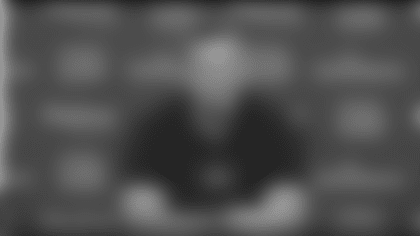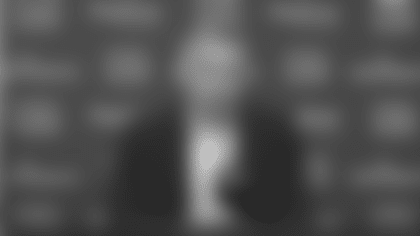**
Initial comments:** ML: "Obviously it's a bittersweet day, the joy of Mike Zimmer having an opportunity to move on and move forward to become the head coach of the Vikings is just a tremendous opportunity, and what he's done in his six seasons here has been outstanding. With what he's gone through in his personal life obviously, but what he's done as a coach is just tremendous--the development of our players, the young players, our system and so forth, and continue to move forward each and every year. I'm very excited for him. But today I'm here to announce and introduce to you Paul Guenther, our new defensive coordinator. I've known Paul as a coach since 2002, when he came to Washington and joined the staff there. I was able to get him over here in '05 with us, and he's worked his way up. He's had an opportunity to learn and do things in a similar situation to what I was put in back when I began with Pittsburgh with Dom Capers and Bill Cowher. We've been able to help Paul move forward, which was the plan that I had in place if Mike (Zimmer) had the opportunity. We reached very quickly to Paul to get him promoted into the position. I'm excited about it. Paul has been here throughout, and it's really a great opportunity for him, a great opportunity for us to continue to grow and move forward, for Paul to put his stamp on things. He's worked very closely with Mike over the last four or five years. It's been great. We can maintain our continuity of what we're doing, but we've got our work cut out ahead of us."
What have the last few years been like working with Mike and what did you take from him?
PG: "Since the first day he got here, I've been by his side most of the time. If you look back at our defense in 2008, it has transformed to now. We've sat side-by-side and put a lot of this stuff together. He had some stuff he brought with him from other teams, but as far as some of the other things we've done and implemented, it has really built up to what it is today."
What would you say your biggest strength is as a football coach?
PG: "Well, coaching the linebackers, you get to know both the run and the passing game, so number one, that's an advantage for me. I do a lot of stuff as far as the blitz packages, but also I was closely knit with the front seven and the running game. There's a lot of things that tie together there, first and second down, third down obviously with the blitz packages. I think my strengths were with nickel pressures we had, and as I became the linebacker coach, I became more involved in stopping the run with the front seven and working closely with the front seven to make sure everybody is on the same page."
Where did you pick up your knack for breaking down protections?
PG: "I picked that up when I was in Washington with Marvin. I had an opportunity to coach with Coach (Steve) Spurrier on offense. I started to look at how defenses were attacking us. I coached the running backs with Hue Jackson and I started to really understand the ins and outs of the protection, and I said 'Wow, this would be a huge advantage if I ever go back to coaching on defense.' You have an understanding of how the linemen are setting, how the backs are blocking, how the quarterback is pointing out hot reads, those type of things. When I got an opportunity to go back on the defensive side of the ball, when I was looking at some of the stuff, I said, 'Why don't we do this? Why don't we do that?' Then we just kind of went from there. I think those two years in Washington really, really helped me understand those things."
You had a couple years working with the secondary. How do you think that will help you and help you form a defensive philosophy?
PG: "Working with the back end is a whole different deal. Having an opportunity to do that, and working with most of the guys that are here today was really good for me. I had an opportunity to work with Kevin (Coyle, former defensive backs coach) and I thought Kevin was a very good secondary coach as far as technique, and Zim is a DBs guy by nature, so really listening to how he was teaching DBs, and going through the film and the offseason studies and those type of things, I've got a great understanding of how things should look back there."
Players talk about coach Lewis and Zim as being players' coaches. Your linebackers talk about you the same way. Are you a big relationships guy?
PG: "I am. I have different relationships with a lot of different guys on the team. Obviously I'm close with the linebackers because I've worked with them pretty much every day. I am a relationship guy. I believe you can hit guys in different ways. There are 25 guys in the room and not all are going to hit on the same clip, so you've got to motivate the group first, then you've got to motivate the individual on the side. Knowing these guys here and knowing their personalities will give me an advantage starting up."
What was it like being a head coach at 25 years old (at Ursinus College), and what kind of experiences did you have there that you think could help you in this day?
PG: "I don't really get nervous much. Usually I've got to talk Zim down on game day. When you're 25 years old, and you get a head coaching job—it was a small college—and at the first meeting you're sitting in an auditorium in front of 100-plus players and their parents. And they're looking at a 25-year-old kid saying, 'I'm going to leave my kid with this guy?' So you learn from all of the decisions you have to make as a head coach. I don't care if it's the NFL or pee wee, you have to make time out decisions, you have to make budgeting decisions, you have to make travel decisions. All of those things that you have to do on a daily basis really helped me today. Coaching the linebackers looks easy, coaching the defense looks easy compared to some of those things that Marvin has to do every day. I think that really helped me in my career, and things don't really affect me as much."
How does your personality fit with the players in contrast to Zimmer?
PG: "I'm not Mike Zimmer. I'm Paul Guenther and I get to put my own stamp on things. I think the world of Zim. I actually want to congratulate him on his opportunity at Minnesota. That's number one. He's got his own personality and I've got my own personality. I've got to be myself. I've got to coach the guys the best I know how and not try to be somebody else."
The two coordinator jobs here were plum jobs. How grateful are you about getting this opportunity?
PG: "It's great. I love the players, I'm close to a lot of the players. I love the city here. Obviously most of you guys know I had opportunities in other places. It all came back to Marvin giving me an opportunity here. And Mr. (Mike) Brown and the Brown family, I want to thank them as well. I've got young kids. I didn't have to move my family. I've got good players that I really like and care for. And really at the end of the day, that was probably the one thing that I said 'OK, I feel bad for these guys, this guy's leaving and that guy's leaving and these guys deserve a good situation.' Ultimately, you can say what you want about a coach, but when you line up between the lines on Sunday, it comes down to the players. And that's one of the messages I'm going to give to those guys. The defense in Cincinnati, people are going to say, 'What's going to happen now?' Well, it really is up to you guys, you understand. So that to me was a big factor."
**
Paul has had two years leading a position group. Do you consider this a quick rise?** ML: "It is a quick rise, but I do think, as already stated, at 25 years old Paul was a head coach at a college program. That's one thing that impressed me. The year we coached together in Washington, his maturity at a young age, his work ethic, his ability to be very, very thorough. Just naturalness as a coach, naturalness with the players, is key to this. There have been a lot of younger guys assume these roles in recent years, and their timeline is sped up because of how they are as a person and how they are as a coach, and he's done that. And every opportunity I've had to advance his career, I've advanced Paul's career. From working with Darrin (Simmons) on special teams, to moving back into the secondary, to becoming the linebacker coach, he's had this opportunity. I've been training him for this day literally, as Bill Cowher used to tell me, the hand-in-glove theory. You know, to make him be in the press box during the game when he wanted to be on the sideline. Every year he'd come to me and say, 'Why can't I be on the sideline?' And I'd say, 'It's because I want you to be me upstairs like I had to be.' I wanted him to get trained for this opportunity.
"And another thing I'd say is that our players should feel good about what they've done, and obviously they've helped two guys move forward and move on in their careers, and I think the players should take some satisfaction in that. And we are changing, we are new now, and we're going to have a newness about us, and that's great because stale doesn't work. We had to kind of start from scratch a few years ago, now we're going to start from scratch again. And it's exciting for me, it's exciting for Paul, for Hue (Jackson). It'll be exciting for Darrin (Simmons). We're going to have some new coaches, and it's great for us, some new blood, some new energy. Because we can't be the same. We don't get to be the same. We've got top be better in 2014 than we were in '13, and that's what our quest is right away."
Will Paul be on the sideline now?
ML: "Yes. We'll talk about it, but I would imagine."
Were you watching Paul a year ago, thinking he might be the next man up?
ML: "Well yeah, that's part of the process. Paul's been in this position. He's worked very closely with Mike. He ran practice when Mike left and went to his daughter's graduation down in Austin this year. Paul ran practice for a day and a half, two days I guess. He's been in this position. And I'm not very far away, but I know what it takes, and I'm really excited for him for this opportunity to grow into this and keep going. We want him to keep moving forward, we want to get better, and we've got an opportunity to do that."
With Adam Zimmer maybe going with his dad to Minnesota, you might have to replace a couple of positions on the staff:
ML: "We'll work on that over the next 48 hours. Hopefully quickly we can get some things done. We'll get that done as quickly as we can."
Does your role change with Zim gone?
ML: "We'll see. I'm excited about it. I've thought a lot about that. The key thing in this, Paul said it, he's got to be himself. He's not Mike. He's got to be himself. That will be good. He's been from the front to the back of our defense, which is great. When I became a coordinator, I hadn't coached in the back end. That was probably the thing I missed the most my first years as a coordinator. Things that I thought were so weren't quite —not that I didn't know, just what I knew wasn't so. So, that's one of the areas Paul's had a chance in. I've been through that, now, and I know those things and the pitfalls of that. So, we're excited to get better and go forward."
What is the biggest challenge of being a coordinator for the first time, as opposed to a position coach?
ML: "I think being a play caller. I remember Zim and I talking about this back in '08, when we sat down and talked about the job. We had been friends for so long, and saw defense and things through the same eyes. But that was my question. I said, 'How do you feel about yourself as a play caller?' He said 'I think that's one of my strengths.' And I would agree today, 100 percent, that was one of Mike Zimmer's strengths. And his thoroughness, and his ability on Sundays to be play caller was excellent. When anybody would ask me about certain qualities about Mike, I thought that was just excellent. He really got in tune on Sundays and did an excellent job. As the defensive coordinator, by Sunday afternoon you are no longer the defensive coordinator, but you are the offensive coordinator for the other club. You've got to assume that position. You've got to through telepathy. You've got to understand them better than they understand themselves. Mike was excellent at that. Going forward, that's going to be the challenge of Paul in this situation in this role. He's not been that."
Paul, what do you draw on with your playcalling?
PG: "Kind of like Marvin was saying, when Zim first got there I would sit up in the press box, and there is a lot of communication going on every play. 'What do you like here? What do you like there?' To be honest with you, I could sit up in the press box and probably 95 percent of the time know what was going to come out of his mouth. Being around the guy and understanding how he calls the game, certain situations, you know it. It's just a matter of going out there and doing it."
Is this a different situation than with Leslie Frazier and Chuck Bresnahan, because you groomed Paul?
ML: "No doubt. He's come up through our system, so we just move forward and move on. The revisions and things we want to improve on in the offseason, we keep moving forward in that. We are not having to start anything from scratch that way. Just excited where we are today."
How does that impact your involvement?
ML: "I've been involved. I am not going to interject myself any further that way, but I am the sounding board and the right of last refusal on everything in every area. So that's not going to change. I am involved in the game planning each and every week. There's things I want to get better at. Those are the things that early this offseason, we'll get started on once we get the staff back together, just like Hue is doing on offense. We are going to do the same thing defensively, take a critical look at ourselves, and look at what we want to focus on getting better prior to us beginning together in April with our players."
What's a bigger challenge: turning around a defense or maintaining what you've already built?
ML: "I think turning something around. They're both equally as challenging, but we know we're built upon fundamentals, and that's not going to change. To play great defense in the National Football League, you've got to be able to tackle, you've got to be able to pressure, and you pressure the football both in the run and the pass. That's how you've got to do it, and that's how we're going to be built upon. That's not going to change. We've got good players, we have some depth, we have good young players, and we're going to add new players to it. We're going to continue to mature and develop those guys. These guys here understand that when we draft a player come May, we're putting our chip on that guy. We're putting our chip on that player for a reason, and it's our job as coaches to draw it out of him, and get it out of him and get him out there, and get him rolling."
Is it a unique circumstance, and how much of a challenge is it to replace both coordinators?
ML: "It's unique. Obviously, it's very unique, and going into the offseason for me, it's got to be different. It's my job to address it right away, and to understand that this offseason will not be like last offseason or the offseason before that. There's real work to do. We've got new people we've got to get them up to speed right away. We're going to have some new coaches on defense, two other new coaches on defense, and we've got new spots on offense and we're going to have to go to work. This offseason is not going to be like any offseason we've had recently. It'll be way different."
What's your best piece of advice as a former defensive coordinator to this first-time defensive coordinator?
ML: "I'm going to tell him what Tony Dungy told me: "Sometimes they might make a yard." (Laughs) Move on. Make a tackle, move on. That's the best piece of advice Tony Dungy gave me in February 1997. They might make a yard every once in awhile. Make a tackle, move on. He's so right. That's the thing that I learned. Your job as the defensive coordinator is to get your guys off the field. That's your job. Nothing else matters. Get your guys as quickly as possible off the field, without the offense scoring. No other stat matters other than that. I always remember that time with Tony."
Do you want to run with these new coordinators for a while now?
ML: "Well, I want to still be playing a year from now at this point and let two guys have an opportunity again. I think it says a lot about the staff. We've got a lot of very good coaches. There are coaches that will have more opportunity as we go, but number one, we've got to be successful, and you've got to be good at what you do and then it gets recognized. We've got to continue with that. When the time comes we'll need to get going."
What's your advice to Zim, as a former defensive coordinator who became a head coach?
ML: "You've got to develop a relationship with the people you're working with day-in and day-out. That's the biggest thing. You're not in this alone. You can't see demons and ghosts and things. We're all in this together, and the whole building has got to feel that from you. You can't alienate yourself from the rest of the building, because we all share in this together, plus and minus. Everybody has to be on the same page, and it's up to you to bring on the same page. There are a lot of good people that don't get an opportunity to affect the wins and losses as much as you and the coaches and the players do on Sunday, but yet they've got to do their job each and every day. So make sure you're supportive of them as well and that the whole building feels that kind of support."













